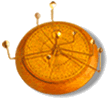Stress
As in English,
stress in Slovenian can fall on any syllable of a word : máti
– mother;
govorìti – to speak; zakaj – without. In the vocabularies
the stress is always marked. In diferent forms of the same word,
the stress occurs quite on different syllables:
nosìti – nósim, mózz – mozzá, cclôvek – cclovèka.
A few words have no stress whatsoever.
The stress marks are: ‘(which signifies at the same time
that the vowel is long, with
o and e a narrow pronounciation), ^ (which signifies simultaneously
long and broad o and e) and ‘ (which means also a short vowel).
Gender
In opposition
to English, which has only remnants of gender (e.g. he-she-it)
Slovenian distinguishes three genders: masculine, feminine and neuter:
| Masc. |
Fem. |
Neut. |
|
on
|
he
|
ona
|
she
|
ono
|
it
|
|
brat
|
brother
|
sestra
|
sister
|
dete
|
child
|
|
occe
|
father
|
mati
|
mother
|
telo
|
body
|
|
Presseren
|
|
Slovenija
|
|
Visoko
|
|
|
stol
|
chair
|
miza
|
table
|
mesto
|
city
|
Male persons and most male animals are masculine gender, female
persons and animals feminine gender. The young of animals (in –e)
are usually neuter gender. For other things and objects we just
have to memorize the gender. The ending in the nominative singular
form offers us some help:
words in –a
are almost all of feminine gender (lipa)
words in –o and –e are almost all neuter gender (mesto,
srce)
words in –i and –u are usually masculine (taksi,
emu)
words ending in a consonant are either masculine or feminine
Jaz
in ti are of indefinite gender.
Adjectives,
participles and most pronouns also have different forms for the
different genders:
| Masc. |
Fem. |
Neut. |
|
Masc. |
Fem. |
Neut. |
|
|
lep
|
lepa
|
lepo
|
nice
|
sedecc
|
sedecca
|
sedecce
|
sitting
|
|
slovenski
|
slovenska
|
slovensko
|
Slovenian
|
náss
|
nassa
|
nasse
|
our’s
|
|
bozzji
|
bozzja
|
bozzje
|
Divine
|
ves
|
vsa
|
vse
|
all
|
|
delal
|
delala
|
delalo
|
worked
|
on
|
ona
|
ono
|
he,she,it
|
|
zazzelen
|
zazzelena
|
zazzeleno
|
desired
|
mi
|
me
|
me
|
we
|
Number
Slovenian
has, besides the singular and plural, also the dual: miza
"table" – mize "tables’ –mizi "(two)
tables". The singular and plural are used as in English, but
in those cases where two objects are concerned, the dual is used
instead of the plural:
|
|
|
| Singular
Plural Dual |
|
|
|
ena
miza
|
tri
mize
|
dve
mizi
|
|
one
table
|
three
tables
|
two
tables
|
|
en
stol
|
trije
stoli
|
dva
stola
|
|
one
chair
|
three
chairs
|
two
chairs
|
|
eno
mesto
|
tri
mesta
|
dve
mesti
|
|
one
town
|
three
towns
|
two
towns
|
|
Paired
body parts are in Slovenian in the Plural: noge, roke, occi,
obrvi, nosnice, etc.,as well ccevlji, occala etc.These
parts of speech distinguish number:
|
| nouns: |
|
|
|
miza
|
mize
|
mizi
|
|
table
|
tables
|
two
tables
|
|
perut
|
peruti
|
peruti
|
|
wing
|
wings
|
two
wings
|
|
stol
|
stoli
|
stola
|
|
chair
|
chairs
|
two
chairs
|
|
mesto
|
mesta
|
mesti
|
|
town
|
towns
|
two
towns
|
|
| adjectives: |
|
|
|
lep
|
lepi
|
lepa
|
|
lepa
|
lepe
|
lepi
|
|
lepo
|
lepa
|
lepi
|
|
| pronouns: |
|
|
|
on
|
oni
|
onadva
|
|
he
|
they
|
they
two
|
|
tak
|
taki
|
taka
|
|
such
|
such
|
such
two
|
|
| verbs: |
|
|
|
delam
|
delamo
|
delava
|
|
I
work
|
we
work
|
we
two work
|
Aleksandra
Ceferin, Thezaurus (Melbourne 2000)
|

